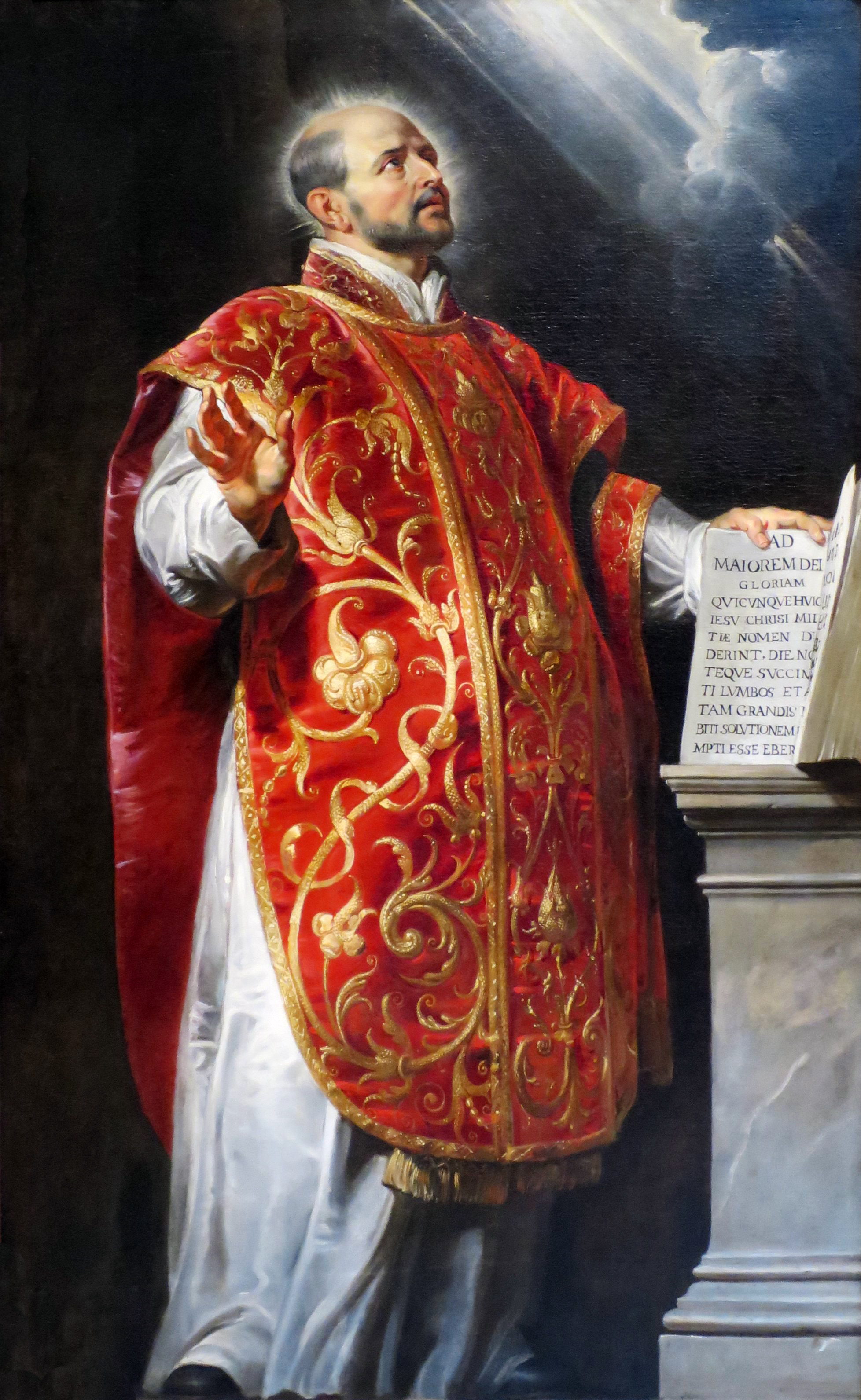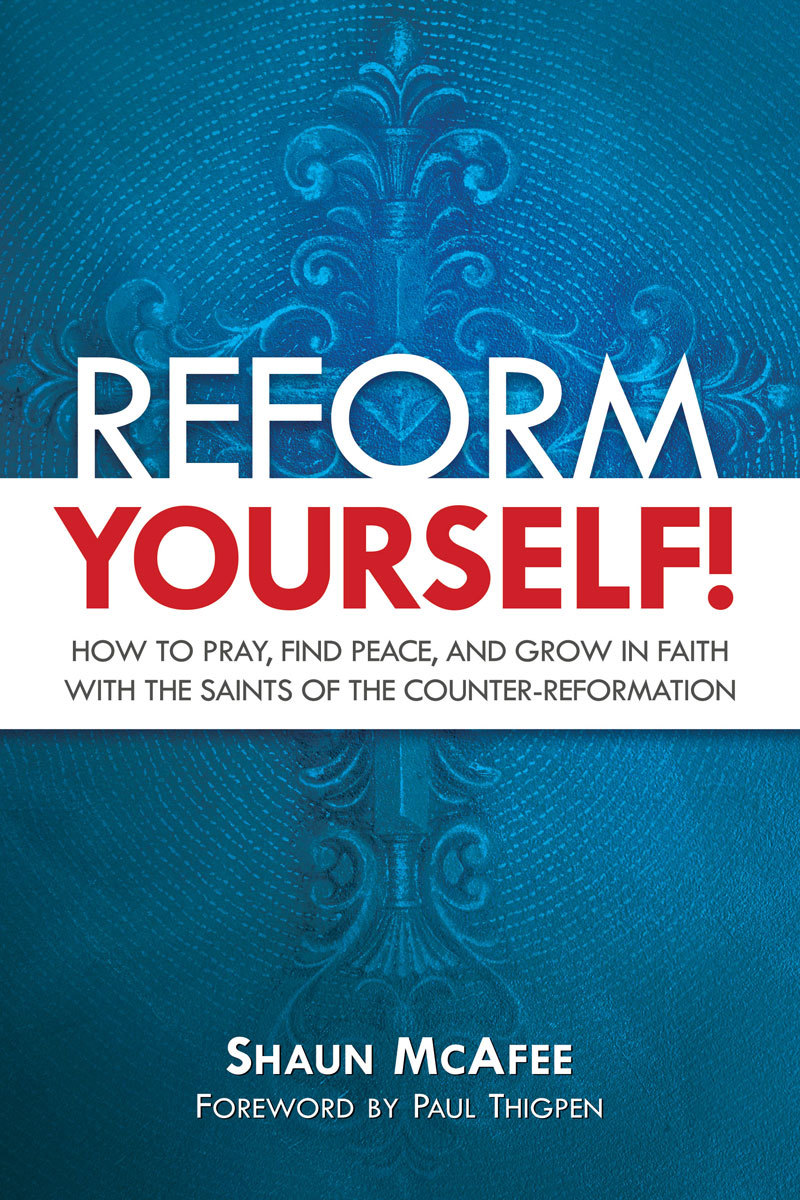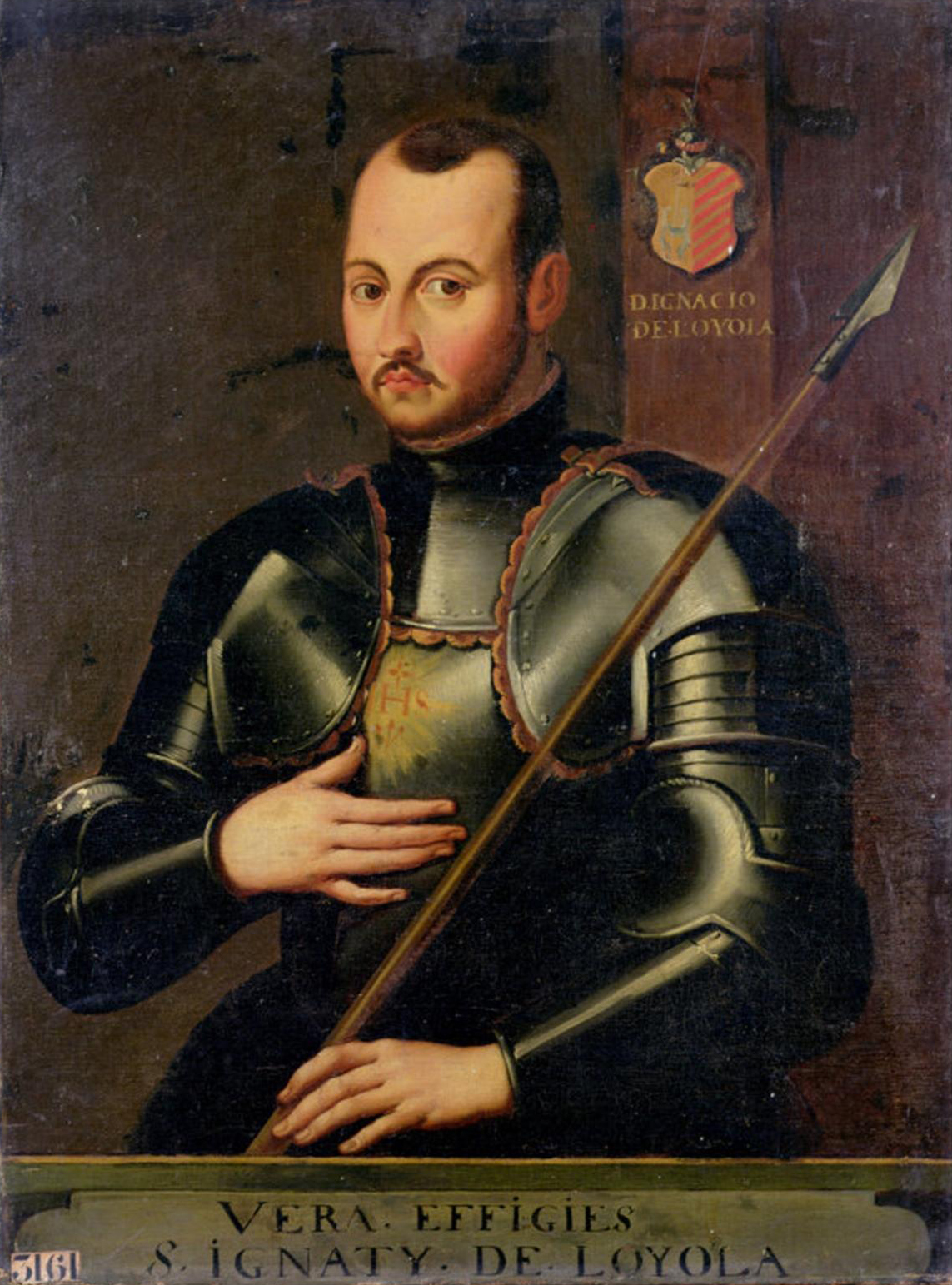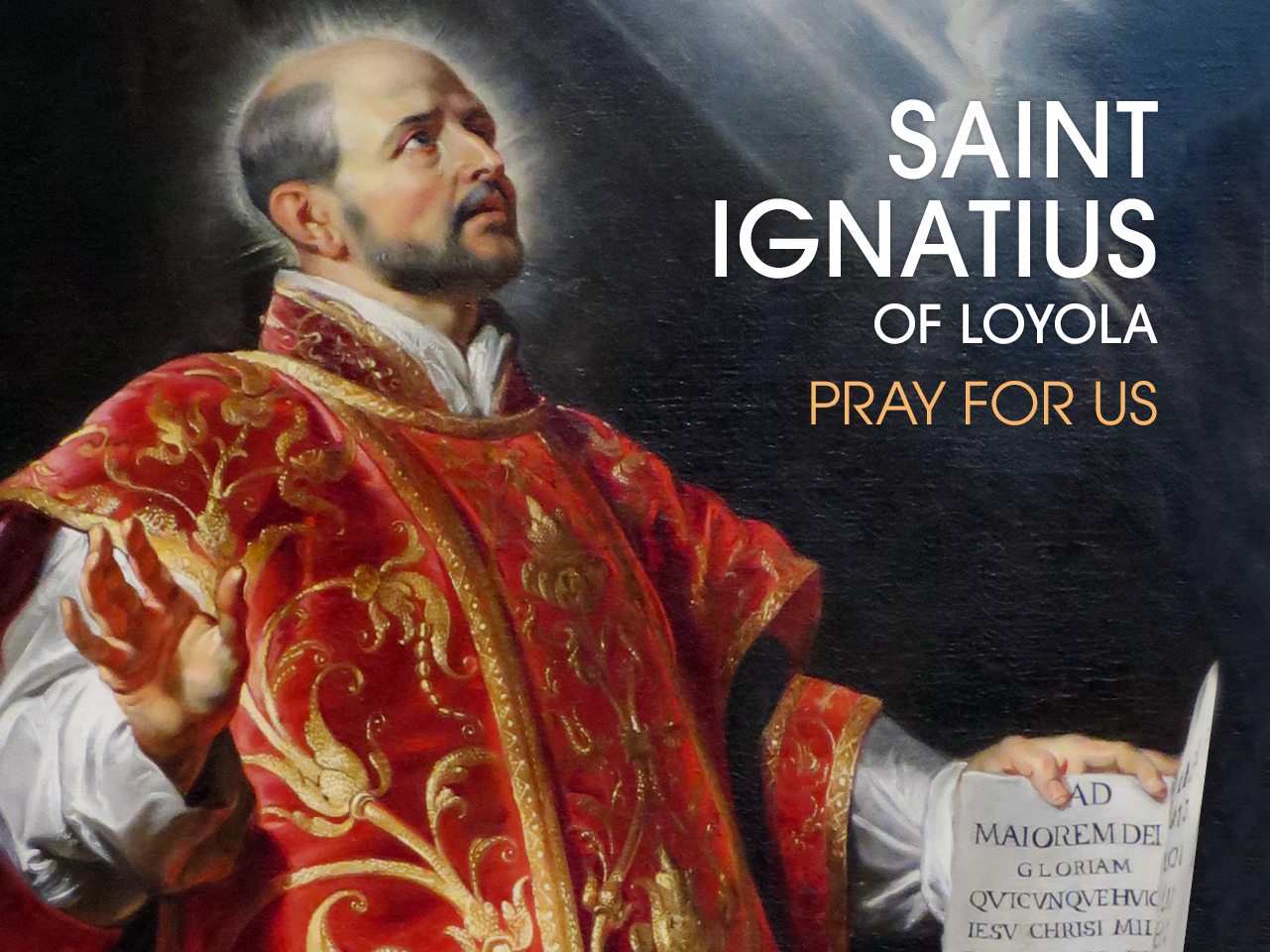“Long before he instructed his followers to, “go forth and set the world on fire,” Ignatius was under his own fire of spiritual and physical combat. His leg was broken, as was his spirit. Legs take us to our destination, but Ignatius no longer knew where that destination was. His whole life he had perfected the profession of a soldier: exercise, training, wielding armor and weapons, imagining the enemy and visualizing victory.
Because he would never be a soldier again, he was convinced that his twenty-three years of life were useless, and that the rest of his life would be spend in the humiliation of defeat and the embarrassment of not being able to resurrect his former skills. On that same bed where he wished for death more than once, he would consider a different sort of death: a death to self.
His physical exercises were about to become his famed Spiritual Exercises; he would put on the full armor of God (Eph. 6:11), wield his word as a sword (Eph. 6:17), and use his imagination to envision himself in victory for heaven.
In order to become this person God created him to be, he knew he must reform himself first, and in a saying often ascribed to him he instructs the same of us: “He who goes about to reform the world must begin with himself, or he loses his labor.”
His Counter-Reformation labors started with himself, and although he accomplished much and his life can teach us copious lessons of Christian charity and virtue, he dominates in two principle areas: education and spirituality.
“The [Second Vatican Council] has considered with care how extremely important education is in the life of man and how its influence ever grows in the social progress of this age.” —Gravissimum Educationis
Sacred art depicting Ignatius usually depicts him studying, reading, writing. It might surprise some to learn, then, that for the first half of his life Ignatius was not an educated man. Though his intellect was strong and aptitude was high, our saint had less than grammar-level education at the age of twenty-three, just a few years before he formed the Society of Jesus and founded colleges. He placed little emphasis on structured learning, perhaps because he was a soldier, yet still came to be one of the most respected educators of his time.
What caused such a change?
The answer is not so simple. To understand what he did, we need to understand his story.
After his leg was shattered in a cannon-ball blast, Ignatius’s dreams of soldiery were gone. But as he said of himself in his autobiography, “his special delight was in the military life,” so if he could not do these things he at least wanted to fill his mind with the thoughts of others doing them. So Ignatius requested books about valiant knights and heroes of war, but there were none.
Instead he was handed The Life of Christ by Ludolph the Carthusian and a book about the lives of the saints. At first he was reluctant to read either but soon found himself engrossed in stories of the heroic virtue, if not quite of the kind he had sought.
After he was healed he continued to study and grow in devotion. He became a gifted street-teacher and built a small following. This drew the attention of the clergy. Around this time the Inquisition was rooting out any potential heresy or corrupted preaching, and without a degree or formal training Ignatius was looked at suspiciously. He was examined briefly by the Inquisition but they found no error in his interview and let him go—but did instruct him not to dress as if he were clergy. He was later summoned again, and again they found no error.
A last time he was examined by the Inquisition, whose verdict resulted in an interesting action by Ignatius. Each time prior, he had explained that he was not preaching or teaching novelties, but was simply conversing with small groups about holy and divine things, occasionally introducing his “exercises” still in development.
This time, he was questioned about his advice to others on faith and morals. In his own autobiographical words:
“So clear and exact was his explanation that his examiners could not find the least flaw in his doctrine. He was equally correct in the answer to the friar who proposed a difficulty in canon law. In every case he said that he did not know the decision of the professors.”
The tribunal’s final verdict was that Ignatius would be free to teach on matters of Christian doctrine, but not on sin or canon law. Not until the tribunal said, he completed four years of study.
“I wish not merely to be called Christian, but also to be Christian.”
–St. Ignatius of Loyola
“The vigor with which you resist the enemy will be the measure of the reward which will follow the combat.”
-St. Ignatius of Loyola
“Man was created for a certain end. This end is to praise, to reverence and to serve the Lord his God and by this means to arrive at eternal salvation. All other beings and objects that surround us on the earth were created for the benefit of man and to be useful to him, as means to his final end; hence his obligation to use, or to abstain from the use of, these creatures, according as they bring him nearer to that end, or tend to separate him from it.”
—St. Ignatius of Loyola, The Spiritual Exercises of St. Ignatius
“Consider not only that God your benefactor is present but also that He acts continuously in all His creatures. And for whom is this continual action, this work of God in nature? For you. Thus, He lights you by the light of day; He nourishes you with the productions of the earth; in a word, He serves you by each one of the creatures that you use; so that it is true to say that at every moment the bounty, the wisdom and the power of God are at your service and are exercised in the world for your wants or pleasures. This conduct of God toward man should be the model of your conduct toward God. You see that the presence of God in His creatures is never idle; it acts incessantly, it preserves, it governs. Beware, then, of stopping at a sterile contemplation of God present in yourself. Add action to contemplation; to the sight of the Divine presence add the faithful accomplishment of the Divine will.”
-The Spiritual Exercises of St. Ignatius
“The beatitude of the saints is immutable, like that of the Son of God. . . Add ages to ages; multiply them equal to the sand of the ocean or the stars of heaven; exhaust all numbers, if you can, beyond what the human intelligence can conceive, and for the elect there will be still the same eternity of happiness. They are immutable, and this immutability excludes weariness and disgust. The life of an elect soul is one succession, without end, of desires ever arising and ever satisfied, but desires without trouble, satiety or lassitude. The elect will always see God, love God, possess God and always will wish to see Him, love Him and possess Him still more. This beatitude is the end destined for all; God has given us time only in order to merit it, being and life only to possess it. Reflect seriously on this great truth, and ask yourself these three questions at the foot of the crucifix: What have I done hitherto for heaven? What ought I to do for heaven? What shall I do henceforward for heaven?”
—St. Ignatius of Loyola, Spiritual Exercises
“When needed, Mary provides for the defense and salvation of her children extraordinary graces and wonderful miracles. What wonders have caused, sustained, spread everywhere, a confidence among Christian people! What striking proofs of her protection the Church recalls to our memory in solemn feasts and devout practices, enriched by precious indulgences! What titles Christians give her to testify to their gratitude, ‘Help of Christians, health of the sick, comfort of the afflicted, refuge of sinners, gate of heaven, our life, our sweetness, our hope!’ What a multitude of people gather to the places where she is most honored, where she obtains the most assistance to those who call on her! What prayers and acts of thanksgiving are offered at the foot of her altars! In our days, what conquests have been made by Our Lady of Victories! What favors have been bestowed on all hearts devoted to the heart of Mary!”
—St. Ignatius of Loyola
“What has He done for me? He has loved me and given me His whole self. What shall I do for Him? I shall love Him and give myself to Him without reserve.”
-St. Ignatius of Loyola
“If you wish to arrive speedily at the summit of perfection, animate yourself to a true love of shame, insults, and calumny.”
-St. Ignatius of Loyola
“What is most valued in religious persons is not the depth of learning and great talents for preaching, nor any other natural or human endowment, but it is humility and obedience, a spirit of recollection and prayer.”
-St. Ignatius
“All the things in this world are gifts of God, created for us, to be the means by which we can come to know Him better, love Him more surely, and serve Him more faithfully.”
— St. Ignatius of Loyola
“For those who love, nothing is too difficult, especially when it is done for the love of our Lord Jesus Christ.”
-St. Ignatius of Loyola

-by Peter Paul Rubens, ca. 1600s
Love & Ignatian joy,
Matthew



